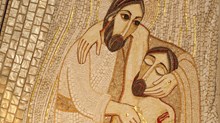Believing in the One God Has Sent
As part of a research project, I recently read the writings, public and private, of Mother Teresa of Calcutta. I don't know what exactly I expected this famous woman's message to the rest of us might be. A statement of the obvious, perhaps: that people, all over the world, suffered.
Or an exhortation that others emulate her own selfless service to the needy. Certainly I expected to hear the voice of a social activist. And, from what I had read about her private writings, discovered in the years following her death in 1997, I knew Teresa would be a woman who struggled mightily, as I have myself, to sense God's presence.
To my surprise, what I discovered in Teresa's writings was a lifelong evangelist, whose single goal in life appeared to have been to communicate the very same "good news of great joy that will be for all the people" that angels announced to some shepherds 2,000 years ago: that "a Savior has been born" to us all and that "he is the Messiah, the Lord" (Luke 2:10-11).
Far from the zealous social servant I was expecting, I found a woman whose mission among some of the world's neediest people was not to serve them or fix their many problems so much as to embody and communicate Christ to them. Indeed, the evangelical focus of Teresa's ministry to the poor so bothered famous atheist Christopher Hitchens that, while Teresa was still alive, he devoted a whole book to the subject of her unworthiness of the world's honor. She was not a philanthropist, he protested, but a zealot. After her private writings revealed 50 years of faith struggles, I found a woman herself in need of God. Hitchens, however, saw a fraud—thus reducing belief in the Messiah, which Jesus identified as the only real "work of God" (John 6:29), to a mindless, question-less, struggle-free confidence of truth that few believers probably experience. But then, even believers are prone to reduce faith to this.
Mother Teresa was especially preoccupied with Jesus' account of how, "When the Son of Man comes in his glory" (Matthew 25:31), he would separate people into two groups, those who had fed and clothed and attended to him in his suffering and those who hadn't. When the groups asked when they had or had not done Jesus these services, he told them, "Truly I tell you, whatever you did for one of the least of these brothers and sisters of mine, you did for me" (Matthew 25:40). As a consequence of Jesus' words on this occasion, it became Teresa's mission not merely to serve others in need but to look for Jesus himself among them. From the depths of her own agony of doubt and longing, she stepped forward in unwavering pursuit of God himself.
Teresa rarely wrote anything without mentioning Jesus—typically many times over - and much of what she wrote simply repeated key points of the gospel. She began her Nobel Peace Prize acceptance speech, to my amazement, by first leading those assembled in corporate prayer, as if at a church service. And then, in the Nobel lecture itself, she argued that the only peace she knew anything about was God's gift of peace that was Jesus himself.
"God loved the world so much that he gave his son," she told her Nobel audience, and that son, "being God became man in all things like us except sin." Having begun my research with my typical cynicism regarding the doings of the famous—especially those held up for public approval—it thrilled me to find this candid encapsulation of the faith I shared promoted in such a secular setting.
Jesus "proclaimed very clearly that he had come to give the good news" of "peace to all of good will," Teresa continued, borrowing from the angels' celebratory song on the occasion of Jesus' birth. And, she noted, referencing the scriptural reading and sermon that got Jesus kicked out of his hometown early on in his ministry, "Jesus became man to bring that good news to the poor." Teresa was still only getting started on her short lecture when she preached, "And as if that was not enough—it was not enough to become a man—he died on the cross to show that greater love, and he died for you and for me and for that leper and for that man dying of hunger and that naked person lying in the street not only of Calcutta, but of Africa, and New York, and London, and Oslo." It's all there, the entire gospel, in a speech just ten minutes or so long.
Teresa's reading of Mary's part in the Christmas story—also included in her Nobel lecture as well as elsewhere in her writings—especially moved me. From the moment Jesus "came in her life," Teresa pointed out, Mary "went in haste" to pass "that good news" on to her cousin Elizabeth. Through Teresa's eyes, I came to see Mary's response to God's call as a picture of the Christian life, not merely her immediate sharing of Jesus within her with those she knew, but in the composition of her experience of God within her as a song of faith—even though, like Teresa, Mary clearly struggled to believe.
From the moment the angel greeted Mary as "you who are highly favored" (Luke 1:28)—before she even knew what the God she worshipped wanted of her—she was already "greatly troubled" (Luke 1:29). She asked how this could be and pondered the ensuing mysteries in her heart. Later in life, she worried that Jesus was actually "out of his mind" (Mark 3:21), and she and her other sons went to fetch him home. Nevertheless, despite her troubles and consternations and worries—and apparently little aided by her particular good fortune in being the very first believer to experience, bodily, what it means to have Christ in her—Mary stumbled after her son to stand at the foot of the cross when he died. Like Mother Teresa. Like me. Like everyone who believes in the One God has sent, I think.
Faith is a strange thing, it seems to me. It is of God, and yet it is the work expected of us. It fills us with certainty, yet inches forward by means of questions, doubts, and musings. Though we long for it and though it hovers close to us, always offered, we have to grope for it, as for an unlit lantern in some dark outbuilding in the night. And some turn away before they find it. But, once grasped and fumbled to a flame, it has the potential to lead us out into the star-filled night.
Copyright © 2010 by the author or Christianity Today/Kyria.com.
Click here for reprint information.
Read more articles that highlight writing by Christian women at ChristianityToday.com/Women
 Read These Next
Read These Next

 Jesus Doesn't Call Us to Merely Be NiceThe life-changing challenge from the Good Samaritan
Jesus Doesn't Call Us to Merely Be NiceThe life-changing challenge from the Good Samaritan
 "I Hate Sex!"There’s hope for your life between the sheets.
"I Hate Sex!"There’s hope for your life between the sheets.








 Homepage
Homepage